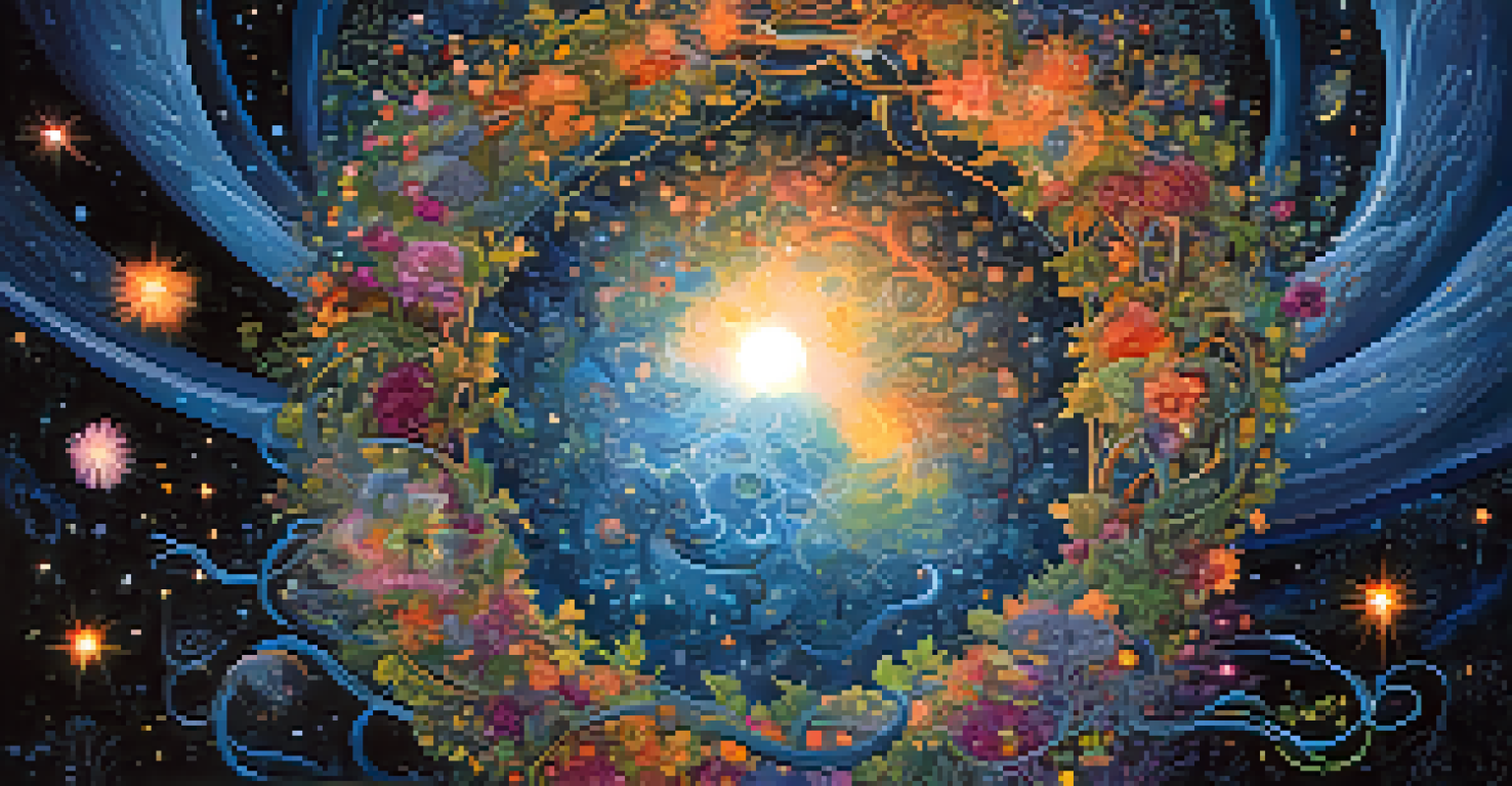Spirituality in the Works of Nietzsche: A Critical Analysis

Nietzsche's Unique Perspective on Spirituality
Friedrich Nietzsche is often associated with atheism, but his works reveal a more nuanced view of spirituality. He doesn't dismiss the concept outright; instead, he critiques traditional religious frameworks, urging individuals to seek their own spiritual paths. This pursuit is less about following dogmas and more about embracing personal truths and existential freedom.
He who has a why to live can bear almost any how.
For Nietzsche, spirituality is deeply tied to the individual's experience and the will to power—the drive to assert oneself and shape one's destiny. He emphasizes the importance of self-overcoming, suggesting that true spirituality emerges from grappling with one's own existence and desires. This creates a dynamic interplay between personal struggle and spiritual awakening.
In his writings, Nietzsche often uses metaphors and allegories to express his spiritual ideas, making them relatable and engaging. By doing so, he invites readers to reflect on their own beliefs and to question the status quo, ultimately fostering a more personal and authentic approach to spirituality.
The Death of God and Its Spiritual Implications
One of Nietzsche's most famous proclamations is the 'death of God,' which reflects the decline of traditional religious authority in modern society. This metaphor highlights the existential crisis that arises in the absence of absolute moral values and spiritual guidance. Nietzsche believes that this void can lead to nihilism, a state where life seems devoid of meaning.

However, Nietzsche doesn't view this as a purely negative outcome. Instead, he sees it as an opportunity for individuals to redefine their values and create their own meaning. This revaluation of values is a spiritual awakening that empowers people to take responsibility for their lives and shape their destinies without relying on external authorities.
Personal Spirituality Over Dogma
Nietzsche encourages individuals to seek their own spiritual paths, moving away from traditional religious frameworks and embracing personal truths.
Through this lens, the death of God becomes a pivotal moment for spiritual exploration, encouraging individuals to embrace their freedom and authenticity. Nietzsche invites us to confront the void and discover new possibilities for spiritual fulfillment beyond traditional religious constructs.
The Role of the Übermensch in Spiritual Development
Central to Nietzsche's philosophy is the concept of the Übermensch, or 'overman,' who embodies the ideal of self-overcoming and personal growth. The Übermensch represents a new kind of spirituality that transcends conventional morals and embraces creativity and individuality. This figure serves as a model for those seeking to cultivate their own spiritual paths.
There is no such thing as moral phenomena, but only a moral interpretation of phenomena.
Nietzsche contrasts the Übermensch with the 'last man,' who symbolizes complacency and mediocrity, living a life devoid of aspiration. The journey towards becoming an Übermensch is fraught with challenges and requires a deep commitment to self-discovery. This process is inherently spiritual, as it involves breaking free from societal constraints and embracing one's true self.
By striving for this ideal, individuals can tap into their creative potential and forge a more meaningful existence. Nietzsche's vision of the Übermensch inspires a kind of spirituality that is proactive, encouraging us to become the architects of our own lives rather than passive recipients of inherited beliefs.
Eternal Recurrence and Its Spiritual Significance
The concept of eternal recurrence is another key element in Nietzsche's philosophy, posing the challenge of living life as if one would have to repeat it endlessly. This idea invites individuals to reflect on their choices and the significance of their actions. Embracing eternal recurrence can lead to a profound spiritual awakening, as it encourages authenticity and a deep appreciation for life.
Nietzsche posits that if one can affirm their life in the face of eternal recurrence, they have achieved a level of spiritual maturity. This affirmation requires a radical acceptance of both joys and sufferings, leading to a holistic understanding of existence. It challenges us to live fully and meaningfully, knowing that every moment counts.
Embrace Life's Challenges
Through concepts like the Übermensch and eternal recurrence, Nietzsche emphasizes the importance of self-overcoming and living authentically in the face of life's struggles.
Thus, the notion of eternal recurrence is not merely a philosophical concept but a powerful spiritual tool. It urges us to examine our lives and strive for a deeper connection with ourselves and the world around us.
Art as a Spiritual Expression in Nietzsche's Thought
For Nietzsche, art holds a profound spiritual significance, serving as a means of expressing the inexpressible aspects of human experience. He believed that art allows individuals to transcend everyday existence and access deeper truths about themselves and the universe. This perspective elevates art to a spiritual practice, as it encourages creativity and self-exploration.
Nietzsche often drew inspiration from the arts, particularly music and tragedy, to illustrate his philosophical ideas. He viewed the artist as a vital figure in society, capable of challenging norms and provoking thought. Through the lens of art, Nietzsche invites us to engage with our emotions and confront the complexities of existence.
By embracing art as a spiritual expression, individuals can find solace and inspiration in their own creative endeavors. This connection between art and spirituality enriches our understanding of both, reminding us that the act of creation can be a deeply fulfilling and transformative experience.
Nietzsche's Critique of Organized Religion
Nietzsche's writings often critique organized religion, particularly Christianity, which he believed stifled individual creativity and authenticity. He argued that religious institutions promote conformity and discourage personal exploration, leading individuals away from genuine spiritual experiences. This critique is not a blanket rejection of spirituality but rather an invitation to seek alternatives.
By challenging the dogmas and rituals of organized religion, Nietzsche encourages individuals to cultivate their own spiritual beliefs based on personal experiences and insights. He argues that true spirituality arises from the depths of one's being rather than from externally imposed doctrines. This perspective fosters a more intimate and personal connection with the divine.
Art as a Spiritual Journey
Nietzsche views art as a vital spiritual expression that allows individuals to explore deeper truths and connect with their own experiences.
Nietzsche's critique serves as a call to action for those seeking spiritual fulfillment. It empowers individuals to question inherited beliefs and to embark on a journey of self-discovery, ultimately leading to a richer and more authentic spiritual life.
The Intersection of Spirituality and Existentialism
Nietzsche's exploration of spirituality is closely intertwined with existential themes, as both emphasize individual existence and the search for meaning. His philosophy challenges us to confront the absurdities of life and to find our own paths amidst uncertainty. This intersection invites a deeper understanding of spirituality as a personal and subjective experience.
Existentialism and Nietzschean thought both reject universal truths in favor of personal authenticity and responsibility. Nietzsche's emphasis on self-overcoming aligns with existentialist ideas, as individuals are called to create their own values and meaning. This shared focus on the individual highlights the importance of personal choice in spiritual development.

By examining the connection between spirituality and existentialism, we can appreciate how both philosophies encourage us to embrace our freedom and navigate the complexities of life. This synthesis offers a rich framework for understanding spirituality as an evolving journey shaped by our choices and experiences.